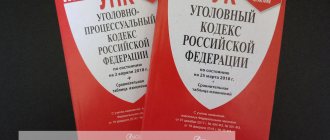The lawyer proved in court the incorrect qualification under Part 3 of Art. 132 of the Criminal Code of the Russian Federation
Lawyer Vladimir Bondarchuk defended B., who was charged by the preliminary investigation authorities under paragraph “a” of Part 3 of Art. 132 of the Criminal Code of the Russian Federation - other actions of a sexual nature, taking advantage of the helpless state of the victim, committed against a minor. The punishment under this article is established in the form of imprisonment for a term of 8 to 15 years.
According to the investigation, B. repeatedly (at least 2 times), while in a car, together with the minor S., knowingly knowing about the latter’s minor age, realizing that the latter may not fully understand the meaning of the actions performed on him, which may limit him the ability to provide any resistance, realizing his criminal intent, aimed at satisfying his sexual desire and sexual passion, put his hands under the victim’s clothes and touched the victim’s naked penis with his hands, causing moral harm to the victim through his criminal actions, moral suffering and a corrupting influence on him.
Interrogated in a criminal case, B. is guilty of committing a crime under paragraph “a” of Part 3 of Art. 132 of the Criminal Code of the Russian Federation, did not admit and showed that he did not have any intention to commit violent acts of a sexual nature against S.
He did not realize and could not realize that S. could be in a helpless state, since S. had never been in such a state and could not have been, being a mentally and physically healthy person, developed in accordance with his age.
Their communication and meetings took place on a voluntary basis, often the initiator of the meetings was S himself. The relationship between them was normal, without quarrels or conflicts.
During the meetings, he did not use any physical or mental violence or any coercion against S.; he did not express any persuasion or threats. When they were with S. inside the car, B. did not hold him in the car or block the car doors.
On the day when police officers found them in the car, they were dressed, and B. did not touch S.’s genitals.
At the stage of the preliminary investigation, lawyer Vladimir Bondarchuk filed a motion to terminate the criminal case and the criminal prosecution of B. under paragraph “a” of Part 3 of Art. 132 of the Criminal Code of the Russian Federation, due to the lack of corpus delicti in his actions for the following reasons.
According to the lawyer, the term “other actions of a sexual nature” contains the adjective “sexual”, which is derived from the word “sex”. In turn, the word “sex” represents sexual intercourse or sexual intercourse.
In contrast to sexual intercourse performed in a natural form, other actions of a sexual nature include actions that simulate sexual intercourse, for example, oral or anal contact, the use of various objects to simulate sexual intercourse, including hands, and aimed at achieving sexual arousal .
The actions set out in B.’s indictment: “touched the naked member of the victim with his hands” cannot be regarded as other actions of a sexual nature, since the content of these actions is not specified or disclosed.
In order for actions performed with hands to be of a sexual nature, they must be performed in a certain way (for example, clasping the penis with a hand and performing back-and-forth movements simulating sexual intercourse), that is, the method of committing the crime under Art. 132 of the Criminal Code of the Russian Federation.
The indictment against B. does not establish the method of committing the crime.
The actions of the accused are not specified, that is, the nature, location and intensity of the touches are not indicated, nor is it indicated whether the accused experienced sexual arousal, based on which it is impossible to come to an unambiguous conclusion that such actions are actions of a sexual nature.
There are significant contradictions in the testimony of the victim S. regarding the fact of the incident, and therefore they should be treated critically.
So, in one of the interrogations, B. explained that he objected to the massage, but B. still continued to massage him; in another, he indicated that he gave his consent to these actions and received money from B. for his consent.
The witnesses interrogated in the case, including the police officers who found B. and S. inside a parked car, were not eyewitnesses to the crime, so they could not explain anything on the merits of the charges brought against B.
The investigator refused to satisfy the stated petition, and the criminal case was sent to the prosecutor, and then to the Kuzminsky District Court of Moscow, with qualification under paragraph “a” of Part 3 of Art. 132 of the Criminal Code of the Russian Federation.
In court at the preliminary hearing, lawyer Bondarchuk V.Yu. filed a petition to return the criminal case to the prosecutor, in connection with significant violations of the criminal procedural law committed by the investigator when drawing up the indictment.
In the petition, the lawyer indicated that the preliminary investigation body had not established the method and time of the commission of the crime, the fact of the helpless state of the victim S. had not been established, as well as the subjective side in the form of the direct intent of the accused B., his awareness of the helpless state of the victim and the use of such a state for the purpose of committing crimes.
The lawyer also stated that the wording used in the accusation is typical for another crime under Part 1 of Art. 135 of the Criminal Code of the Russian Federation (depraved acts). This crime belongs to the category of crimes of minor gravity, since the maximum punishment under this article is provided for in the form of 3 years of imprisonment.
The court rejected the request to return the case to the prosecutor, and the criminal case charging B. with committing a particularly serious crime was considered by the court on its merits.
Speaking in the debate, the state prosecutor was forced to agree with the position of Bondarchuk’s lawyer V.Yu. and indicated that the preliminary investigation authorities qualified B.’s actions under paragraph “a” of Part 3 of Art. 132 of the Criminal Code of the Russian Federation is incorrect, and that such actions should be qualified under Part 1 of Art. 135 of the Criminal Code of the Russian Federation, as indecent acts.
Due to the fact that B. had previously served a sentence of imprisonment for committing similar crimes, and his actions contained a relapse, the prosecutor asked B. to be sentenced to imprisonment for a period of 2 years and 8 months.
During the debate, defendant B. admitted his guilt in committing a crime under Part 1 of Art. 135 of the Criminal Code of the Russian Federation, he repented of his crime and apologized to the victim’s representative.
Lawyer Vladimir Bondarchuk, based on the position of client B., agreed with the prosecution regarding the qualification of B.’s actions, but did not agree with the amount of punishment proposed by the prosecutor, asking the court to apply to his client the provisions of Part 3 of Article 68 of the Criminal Code of the Russian Federation and sentence him to form of imprisonment for a term of less than one year.
On September 22, 2022, by the verdict of the Kuzminsky District Court of Moscow, B. was found guilty under Part 1 of Art. 135 of the Criminal Code of the Russian Federation, and he was sentenced to 2 years and 6 months of imprisonment.
The court included in the sentence period about two months of B.’s detention from the moment of his arrest, as well as almost a year of house arrest (two days of arrest for one day of imprisonment).
Currently, the defense has filed an appeal against the court's verdict, in connection with significant violations of the criminal procedural law committed by the preliminary investigation body and the court due to the established incorrect classification of B.'s actions, which resulted in the deprivation of B. of the procedural right to benefit from the consideration of his case in a special manner and the court assigning him a more severe punishment.
Legislation in the Russian Federation is changing rapidly, so the information in this article may have lost its relevance. To get an answer to your question, use an online consultant or call a lawyer at: +7(926)254-36-86.
Similar articles:
Changing the court verdict under Part 3 of Art. 159 of the Criminal Code of the Russian Federation in the Second Court of Cassation
The result of a review of a criminal case after the verdict was overturned in cassation.
How to force a child's father to pay child support
Extension of a loan agreement - what is it?
Contrary to popular belief, acquittals do happen. True, very rarely, within one to two dozen per year throughout St. Petersburg, that is, out of about forty thousand. And a pure acquittal for the entire scope of the charge due to the absence of a crime, and even less often, does not come across every year. The case was not widely reported in the media; After the case was brought to court, they simply forgot about it. It’s for the better, otherwise we cannot avoid loud headlines in the press like “A pedophile was acquitted in St. Petersburg” or “The court found a child rapist not guilty”, heart-rending calls for violence in the comments, and, of course, disgusting arguments about corruption and incompetence judges who pronounced the sentence. We have observed this more than once, as, for example, in this extremely unpleasant and dubious matter.
The criminal case was considered by the Kuibyshevsky District Court of St. Petersburg, in a closed court session, as required by law. A panel of three judges thoroughly studied all the circumstances of the case, examined the evidence available in the case and came to the conclusion that my client was completely innocent. The prosecutor's office did not agree with the court's verdict and appealed it to the St. Petersburg City Court. Over the course of five sessions, the judicial panel for criminal cases of the city court checked the legality and validity of the verdict, ordered a re-examination and, based on the results, upheld the verdict of the district court.
As for the justification itself, everything is quite simple - the court checked the testimony of the minor victim and found it untrue. Much more interesting was the reaction of the prosecution to the new circumstances of the case. Investigators from the Investigative Department for the Central District of the Main Investigative Directorate of the Investigative Committee of the Russian Federation in St. Petersburg, Tatyana Viktorovna Baryshpolets and Ivan Sergeevich Lyalitsky, who were investigating this criminal case, were summoned and interrogated to the court. The country must know its heroes. During the interrogation, investigator Baryshpolets “remembered” that the defendant, left alone with her, admitted his guilt and even repented of what he had done, and after a conversation with the lawyer began to refuse to testify. The court considered these testimonies unreliable and gave them an appropriate assessment in the verdict. You can read more about the quality of such testimony from investigators and other representatives of the prosecution in a separate article on my blog.
Attached files
- acquittal-verdict File size: 2 MB Number of downloads: 3484
Lawyer - Pushkarev Yakov Vasilievich
Knowledge of exculpatory judicial practice, the arguments given by the courts in their decisions in favor of those accused and convicted of crimes against sexual integrity, helps the defense to most fully realize their rights in criminal proceedings, to substantiate their position most convincingly. Understanding that some specific argument, some specific circumstances allowed the court in another criminal trial, but in a similar situation to question the validity of the accusation, or allowed the court to change qualifications, or even reduce penalties, gives some confidence in the correctness of the chosen line protection.
This article presents excerpts from sentences, resolutions and rulings on the acquittal of persons accused under Articles 131, 132 of the Criminal Code of the Russian Federation and other crimes against sexual integrity. Here are also excerpts from court decisions of the appellate and cassation instances changing or overturning convictions under these articles.
If you know similar court decisions, you can post a link to them, or an excerpt from this decision in the commentary to this article, and I will post an excerpt from this court decision in the article itself.
I will warn you in advance that in view of the specifics of this category of criminal cases, and their consideration in closed court sessions, the names (or full names) of participants in criminal cases should be changed to capital letters. You should also delete other information that allows you to identify the participants in the criminal case, the names of streets, enterprises, institutions, and organizations.
To the extent possible, this article will be supplemented by judicial practice, which I studied independently as I worked on criminal cases of this category.
Sincerely, lawyer Yakov Vasilievich Pushkarev
REVIEW OF APPEAL PRACTICE OF THE JUDICIAL COLLEGE
ON CRIMINAL CASES OF THE KIROV REGIONAL COURT
FOR THE FIRST HALF OF 2014
By the verdict of the Vyatskopolyansky District Court of the Kirov Region dated November 15, 2013, E. was convicted of committing crimes under paragraph “a” of Part 3 of Art. 131, paragraph “a”, part 3, art. 132 of the Criminal Code of the Russian Federation. For each crime, a sentence of 8 years in prison was imposed. Based on Part 3 of Art. 69 of the Criminal Code of the Russian Federation finally imposed 9 years of imprisonment to be served in a high-security correctional colony. The court found it proven that E. had committed acts of a sexual nature with the threat of violence against the victim, coupled with a threat of murder, qualifying the actions of the convicted person under paragraph “a” of Part 3 of Art. 132 of the Criminal Code of the Russian Federation. At the same time, the court indicated in the verdict that this crime was committed with the use of violence, which E. was not charged with. In addition, the sanctions of Part 3 of Art. 131 and part 3 of Art. 132 of the Criminal Code of the Russian Federation provides for punishment in the form of imprisonment with deprivation of the right to hold certain positions or engage in certain activities, or without it, with restriction of freedom. In violation of the requirements of criminal, as well as criminal procedural laws, the court in its verdict did not justify the non-appointment of additional types of punishment to E. under paragraph “a” of Part 3 of Art. 131 and paragraph “a”, part 3, art. 132 of the Criminal Code of the Russian Federation, including mandatory additional punishment in the form of restriction of freedom. Also, when assigning punishment to E., the court of first instance took into account the commission of crimes against a minor, while this circumstance is a qualifying feature provided for in paragraph “a” of part three of Articles 131 and 132 of the Criminal Code of the Russian Federation, and could not be taken into account again when assigning punishment. According to the verdict, no aggravating circumstances were established, and the following were recognized as mitigating circumstances: the presence of dependent young children, confession, sincere confession, active contribution to the detection and investigation of crimes, partial voluntary compensation to the victim for moral damage. These mitigating circumstances were recognized by the judicial panel as exceptional. The verdict was changed on appeal. Excluded from conviction under paragraph “a” of Part 3 of Art. 132 of the Criminal Code of the Russian Federation the qualifying feature “with the use of violence”, the indication on the imposition of punishment taking into account the commission of crimes against a minor is excluded. Using Art. 64 of the Criminal Code of the Russian Federation E. was sentenced under paragraph “a” of Part 3 of Art. 131 of the Criminal Code of the Russian Federation in the form of 7 years of imprisonment without deprivation of the right to hold certain positions or engage in certain activities and without restriction of freedom, under paragraph “a” of Part 3 of Art. 132 of the Criminal Code of the Russian Federation in the form of 7 years of imprisonment without deprivation of the right to hold certain positions or engage in certain activities and without restriction of freedom. Based on Part 3 of Art. 69 of the Criminal Code of the Russian Federation finally imposed 8 years of imprisonment.
REVIEW OF CASSATION AND SUPERVISION PRACTICE OF THE JUDICIAL COLLEGE FOR CRIMINAL CASES OF THE KRASNOYARSK REGIONAL COURT FOR 2012
Sh. was convicted under paragraph “b” of Part 4 of Art. 132 of the Criminal Code of the Russian Federation. The court of cassation overturned the verdict and sent the case for a new trial. Thus, the court based the charges on the testimony of the victim’s representative B. during the preliminary investigation, while she was interrogated in the court of first instance. Witness P. was also questioned at the court hearing, however, to confirm the proof of the defendant’s guilt, her testimony at the preliminary investigation was given without citing her testimony in court in the verdict, as in the case of B.’s testimony, and, thus, a proper analysis of those given in the verdict The appealed verdict does not contain evidence. In addition, the content of the testimony of witnesses Sh., A., B., E., set out in the verdict and forming the basis of the accusation, does not correspond to the content of their testimony set out in the protocol of the court session; The court also referred to the testimony of witnesses M., A., but did not provide their content in the verdict. In accordance with Art. 6 of the Code of Criminal Procedure of the Russian Federation, criminal proceedings are intended to protect the rights and legitimate interests of persons and organizations that have suffered from crimes. The minor victim B. (born in 2009) due to her age is not able to defend her rights and legitimate interests. However, her representative chose a position that was contrary to the interests of the victim, which she also confirmed in the cassation appeal and in the cassation court. The possibility for B. to represent the interests of the victim given her position was not discussed by the court of first instance
SUPREME COURT OF THE RUSSIAN FEDERATION DECISION dated August 15, 2013 N 19-APU13-16SP
According to the verdict of the Stavropol Regional Court of March 26, 2013, passed with the participation of jurors, V. was convicted under paragraph “b” of Part 2 of Art. 179, paragraph “a”, part 3, art. 132, paragraph “a”, part 3, art. 132, part 1 art. 115, part 1 art. 116 of the Criminal Code of the Russian Federation. V. was found guilty of coercion to complete a transaction under threat of violence and with the use of violence, committing violent acts of a sexual nature against a minor victim, assault and causing minor harm to health, causing short-term health disorder. In their appeals, the convict and the lawyer asked to change the sentence, pointing out that the testimony of the victim during the preliminary investigation was read out in violation of the provisions of Art. 281 of the Code of Criminal Procedure of the Russian Federation, the presence of the victim in the territory of another state for the purpose of training cannot be an emergency circumstance that prevents her from appearing in court. On August 15, 2013, the Judicial Collegium for Criminal Cases of the Supreme Court of the Russian Federation overturned the verdict on the following grounds. This criminal case was considered in the absence of the minor victim, whose testimony in the indictment is presented as evidence for all episodes of the charges brought against the convicted person. At the court hearing, the state prosecutor filed a petition to read out the testimony of the minor victim due to the fact that she is outside the Russian Federation, the circumstances of the case relate to the intimate side of the life of a minor child, and her interrogation at the court hearing may cause her psychological trauma. Despite the defense's objections, the court recognized the circumstances of the minor victim's absence from the court hearing as exceptional. The presiding judge in the case decided to satisfy the request of the state prosecutor with the issuance of a protocol decision without reference to the rule of law. The victim's testimony was read out at the trial in the presence of jurors. At the same time, if the victim fails to appear at the court hearing, the reading of his testimony previously given during the preliminary investigation is allowed without the consent of the parties only in cases provided for in Part 2 of Art. 281 Code of Criminal Procedure of the Russian Federation. There is no reference to such grounds either in the petition of the state prosecutor or in the ruling of the presiding judge. The case materials do not contain information about the proper summons of the minor victim to the court hearing and the presence of circumstances preventing her from appearing in court, and therefore the testimony of the victim at the court hearing was read out in the presence of jurors in violation of the law. Thus, the court of first instance did not ensure procedural equality of the parties in the trial, and the rights of the defendant were significantly limited.
RESOLUTION OF THE PRESIDIUM
OF THE SUPREME COURT OF THE RUSSIAN FEDERATION N 27-P14
In accordance with Part 2 of Art. 63 of the Criminal Code of the Russian Federation, if an aggravating circumstance is provided for by the corresponding article of the Special Part of the Criminal Code of the Russian Federation as a sign of a crime, it in itself cannot be taken into account again when assigning punishment. By the court's verdict, Z. (previously convicted under paragraph “c” of Part 3 of Article 131, paragraph “c” of Part 3 of Article 132 of the Criminal Code of the Russian Federation) was convicted under Part 5 of Art. 132 of the Criminal Code of the Russian Federation. The Judicial Collegium for Criminal Cases of the Supreme Court of the Russian Federation, having considered the case based on the appeals of the convict and his lawyer, changed the verdict regarding the punishment imposed on Z. According to the verdict, Z. was found guilty of committing acts of a sexual nature against a person under fourteen years of age, and his actions, taking into account the qualifying sign of the commission of a crime by a person who has a criminal record for a previously committed crime against the sexual integrity of a minor, are qualified under Part 5 of Art. 132 of the Criminal Code of the Russian Federation, the sanction of which provides for a more severe punishment than for acts of a sexual nature committed under other qualifying criteria. Recognizing the presence of the specified qualifying feature in Z.’s actions, the court proceeded from the fact that earlier, by the verdict of July 27, 2000, he was convicted under paragraph “c” of Part 3 of Art. 131, paragraph “c”, part 3, art. 132 of the Criminal Code of the Russian Federation for committing crimes against the sexual integrity of minors, while the conviction for these crimes has not been expunged. At the same time, the court, having established at the hearing that Z. had committed a particularly serious crime, having a previous conviction for a particularly serious crime, recognized the presence of relapse as an aggravating circumstance and sentenced him taking into account this aggravating circumstance. Thus, the court took into account the criminal record under the verdict of July 27, 2000 as a qualifying feature of the crime provided for in Part 5 of Art. 132 of the Criminal Code of the Russian Federation, and as an aggravating circumstance provided for in paragraph “a” of Part 1 of Art. 63 of the Criminal Code of the Russian Federation, that is, the court took into account the same circumstance twice when sentencing Z. Meanwhile, in accordance with Part 2 of Art. 63 of the Criminal Code of the Russian Federation, if an aggravating circumstance is provided for by the corresponding article of the Special Part of the Criminal Code of the Russian Federation as a sign of a crime, it in itself cannot be taken into account again when assigning punishment. This requirement of the criminal law was violated by the court, which resulted in a worsening of the situation of the convicted person. Taking into account the above, the Judicial Collegium excluded from the verdict the court’s instruction to recognize recidivism as an aggravating circumstance and commuted the punishment imposed on Z. under Part 5 of Art. 132 of the Criminal Code of the Russian Federation, and imposed punishment for the totality of crimes according to the rules of Part 5 of Art. 69 Criminal Code
SUPREME COURT OF THE RUSSIAN FEDERATION DECISION dated September 24, 2012 N 38-O12-11
Restriction of freedom is not imposed on persons who do not have a place of permanent residence on the territory of the Russian Federation. The panel of judges changed the verdict of the Perm Regional Court of June 22, 2012 in relation to K., convicted of a crime committed between January 10 and January 31, 2011, under paragraph “b” of Part 4 of Art. 132 of the Criminal Code of the Russian Federation (as amended by Federal Law No. 377-FZ of December 27, 2009). The imposition of additional punishment in the form of restriction of freedom was excluded from the sentence. When imposing an additional punishment in the form of restriction of freedom, the court did not take into account that K. is a person of no fixed abode. By virtue of Part 6 of Art. 53 of the Criminal Code of the Russian Federation, restriction of freedom is not imposed on persons who do not have a place of permanent residence on the territory of the Russian Federation. Therefore, this punishment is subject to exclusion from the court sentence.
SUPREME COURT OF THE RUSSIAN FEDERATION DECISION dated April 20, 2012 N 72-D12-2
3.1.2. According to Part 6 of Art. 53 of the Criminal Code of the Russian Federation, restriction of freedom is not imposed on military personnel, foreign citizens, stateless persons, as well as persons who do not have a place of permanent residence on the territory of the Russian Federation. By the verdict of the Moscow City Court dated February 17, 2011, D. was convicted under Part 3 of Art. 30, paragraph “b”, part 4, art. 131 of the Criminal Code of the Russian Federation for 14 years of imprisonment in a maximum security correctional colony with restriction of freedom for 2 years, with the establishment of specific restrictions. When assigning D. restriction of freedom for a period of 2 years as an additional punishment, the court did not take into account the provisions of Part 6 of Art. 53 of the Criminal Code of the Russian Federation, according to which restriction of freedom is not imposed on military personnel, foreign citizens, stateless persons, as well as persons who do not have a place of permanent residence on the territory of the Russian Federation. The court established and stated in the verdict that D. is a citizen of another state - the Kyrgyz Republic, and does not have a place of permanent residence in the Russian Federation. These circumstances excluded the imposition of an additional punishment on him - restriction of freedom. The panel of judges changed the court's verdict, namely, it excluded the indication of imposing an additional punishment in the form of restriction of freedom for a period of 2 years.
If you or your loved ones need legal advice or other legal assistance in criminal cases of rape or other crime against sexual inviolability, you need the services of a lawyer in Khabarovsk during the preliminary investigation, in the court of first instance, or when appealing a verdict, you can contact me at phone 8 (4212) 66-60-01.






